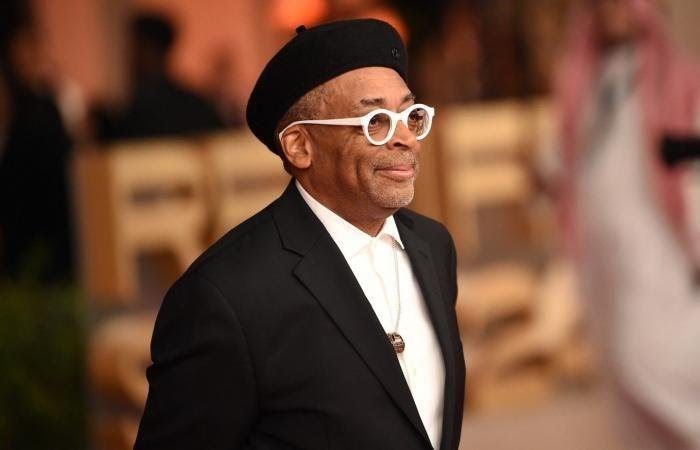Spike Lee, one of the most iconic directors in American cinema, is this year’s jury president for the 4ᵉ edition of the Red Sea International Film Festival (RSIFF), held in Jeddah, Saudi Arabia. Known for his provocative style, commitment to social justice, and hard-hitting storytelling, he captivated the audience with a conversation where he shared personal anecdotes, reflections on his career, and advice for aspiring filmmakers. His talk was full of humour, passion and profound wisdom.
A legendary collaboration with Denzel Washington
Spike Lee confirmed that he had just completed his fifth film with Denzel Washington, entitled High and Low, a ‘reinterpretation’ of Kurosawa’s Japanese masterpiece High and Low. He explained: ‘I’ve always been fascinated by Kurosawa. His film Rashomon even inspired She’s Gotta Have It.’
When asked about the actor’s possible retirement, Spike Lee replied: ‘Denzel wants to devote himself to theatre, and I’m happy for him. As for me, I still have time. Kurosawa made his last film when he was 81. He added: ‘If you can make a living doing what you love, that’s a blessing. My destiny is to become a filmmaker.’
The challenges of Malcolm X
Spike Lee spoke in detail about the obstacles encountered in making Malcolm X, a film he considers to be one of the most important of his career. ‘The project was on the verge of collapse on several occasions’, he explained. The budget problems were particularly critical: ‘The studio wouldn’t give us the money we needed to make the film the way it was supposed to be. I had to call figures like Oprah Winfrey, Michael Jordan and Bill Cosby to contribute financially.’
He also mentions the political and social pressures: ‘A lot of people didn’t want this film to be made. I was even advised not to tackle such a controversial figure as Malcolm X. But I knew this story had to be told. But I knew this story had to be told.’
Filming in Saudi Arabia represented an immense logistical and cultural challenge. ‘I waited two weeks on location to obtain a court order authorising me to film in Mecca during the hajj. We finally got permission, an historic first. The film crew was made up of Muslims, and we managed to capture some unique moments.’
This experience had a profound effect on Lee: ‘Filming sacred places with such respect strengthened my understanding of Malcolm’s faith and what transformed him. It was humbling for all of us.’ He expressed his gratitude to the Saudi authorities for their cooperation and openness. ‘Being here today, as president of the jury, is a logical next step for me. This festival allows me to discover cinemas that I know little about, particularly Arab cinema. And I’m impressed by the richness and diversity of the stories I’m discovering here.
A career marked by struggle
Spike Lee has also shared reflections on his documentary 4 Little Girls (1997), about the racist attack by the Ku Klux Klan on the 16th Street Baptist Church in Birmingham, Alabama, in 1963. The attack claimed the lives of four young African-American girls: Addie Mae Collins, Cynthia Wesley, Carole Robertson and Denise McNair. Spike Lee explained: ‘This film was emotionally difficult to make. I went back to Birmingham and spoke to the families of the victims and those who knew them. The parents of these young girls have never been able to recover from this tragedy.’
The director described the impact of the documentary: ‘The FBI knew from the first days of the investigation who was responsible, but it wasn’t until my documentary that the case was reopened. A few days before the Oscar nomination, the FBI asked me for a copy of the film. A week after the FBI viewed the film, they charged the murderers. This shows the power of film to make things happen.’ Spike Lee continued: ‘I worked like crazy to make this film to bring this injustice to the public’s attention. This documentary remains one of the things I’m most proud of.’
Advice to future filmmakers
As a professor at New York University, Spike Lee attaches particular importance to passing on his knowledge. ‘I always tell my students: ‘Cinema is no joke. You have to dedicate your life to it, work hard and never cheat.
He often recommends classics such as Who’s in Town? and sometimes invites directors to talk to his students. He also expressed his enthusiasm for young talent, particularly from minority backgrounds. ‘This industry is very tough, especially for black people. But I love working with actors on their first role. Some of them are extraordinary.’
Anecdotes and humour
With his usual humour, Spike Lee shared some amusing anecdotes. ‘I asked Michael Jordan why he agreed to shoot a commercial with me. He replied: ‘Because you’re wearing my shoes! What he meant was that they looked very much alike, since they were both born into the same environment in Brooklyn.
He also talked about his childhood in Brooklyn: ‘My father hated Hollywood films, but my mother loved them. I’m a product of both.
As for his time management, he revealed: ‘I get up at 6am every morning. I often write for four hours straight. On shoots, he prefers to limit the days to 8 or 10 hours to ensure a good atmosphere and tries to keep a good atmosphere at all times, which doesn’t stop him from shouting occasionally if he has to. ‘If the team isn’t happy, you don’t get the best.’
Spike Lee concluded his session by reiterating his love for cinema and his gratitude to life: ‘Are you ready to dedicate your life to your passion? If so, you will be blessed. I am.’
TunisianMonitorOnline (TMO correspondent Douha Saafi – English NejiMed)




